Leveling as a Druid with Pulverize, Landslide, Companions, or Shred
Please note that our Pulverize, Landslide, Companions, and Shred Druid leveling guides are on separate pages, so if you are looking for them, you can access them using the buttons below.
Leveling a new Druid character can be done with either ![]() Pulverize,
Pulverize, 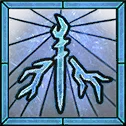 Storm Strike and Companions,
Storm Strike and Companions, 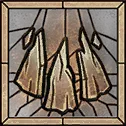 Landslide, or
Landslide, or ![]() Shred. We currently believe these starter builds to be the best options available. Check the guides for all the details specific to each build, including Skill Trees, Gear, and Paragon.
Shred. We currently believe these starter builds to be the best options available. Check the guides for all the details specific to each build, including Skill Trees, Gear, and Paragon.
All of our Druid levelling builds will be about the same in terms of how fast it will be to level up. It comes down to a personal choice for the playstyle you wish to use while leveling. Whereas the ![]() Pulverize,
Pulverize, ![]() Landslide, and
Landslide, and ![]() Shred builds all focus on a more active playstyle, the companion build utilizes
Shred builds all focus on a more active playstyle, the companion build utilizes ![]() Wolves,
Wolves, ![]() Poison Creeper, and
Poison Creeper, and ![]() Ravens in a more passive playstyle allowing your companions to do most of the damage.
Ravens in a more passive playstyle allowing your companions to do most of the damage.
General Leveling Tips
The recommended World Tier to level in is 1 (Adventurer). This will provide you with the smoothest and fastest leveling experience. If you like the added challenge, you can of course play in World Tier 2 (Veteran), but the extra experience from monsters does not make up for the added time it takes to kill them, and this will generally result in a slower and clunkier leveling process.
In regard to leveling up on the seasonal realm, you might also want to check out our season checklist, as it will give you some useful tips and tricks on how to tackle Season 4 of Diablo 4. Don’t miss this chance to make the most out of your leveling journey!
Before you can engage in endgame activities like the Capstone Dungeon (which unlocks World Tier 3), Nightmare Dungeons, or the Tree of Whispers, you must complete the main storyline.
Getting a mount is an important step in your leveling journey, and we recommend generally saving your explorations of the world (such as for obtaining Altars of Lilith) for until after you get it. For more details, read our mount guide.
Spirit, Druid’s Resource
Spirit makes a return in Diablo 4 as the Druid class resource. Monk players coming from Diablo 3 should be very familiar with the way this resource works as it is functionally the same.
Spirit has a natural cap of 100 and does not replenish nor decrease over time. It is instead generated by casting the spammable Basic Skills and expended by the more powerful Spirit Skills.
Several Druid passives also improve Spirit generation in various ways.
Spirit Boons, Unique Druid Class Mechanic
The primary unique class mechanic of the Druid are the Spirit Boons, which provide you with a selection of special bonuses tied to different animal Spirits. You can equip one of four Boon per Spirit, and one additional Boon for the animal Spirit with which you bond, for a total of 5. The following table lists these Spirit Boons.
| Spirit | Boon 1 | Boon 2 | Boon 3 | Boon 4 |
|---|---|---|---|---|
| Deer | Prickleskin Gain X Thorns. | Gift of the Stag Gain 40 Maximum Spirit. | Wariness Take 15% reduced damage from Elites. | Advantageous Beast 15% Movement Speed and 15% Impairment Reduction |
| Eagle | Scythe Talons Gain 10% increased Critical Strike Chance. | Iron Feather Gain 20% Maximum Life. | Swooping Attacks Gain 15% Attack Speed. | Avian Wrath Gain 30% Critical Strike Damage. |
| Wolf | Packleader Lucky Hit: Critical Strikes have up to a 25% chance to reset the Cooldowns of your Companion Skills. | Energize Lucky Hit: Dealing damage has up to a 15% chance to restore 30 Spirit. | Bolster Fortify for 25% of your Maximum Life when you use a Defensive Skill. | Calamity Extend the duration of Ultimate Skills by 25%. |
| Snake | Obsidian Slam Every 10th kill will cause your next Earth Skill to Overpower. | Overload Lucky Hit: Dealing Lightning damage has up to a 40% chance to cause the target to emit a static discharge, dealing 20% Lightning damage to surrounding enemies. | Masochistic Lucky Hit: Critical Strikes with Shapeshifting Skills have up to a 75% chance to Heal you for 5% of your Maximum Life | Calm Before the Storm Lucky Hit: Nature Magic Skills have up to a 10% chance to reduce the Cooldown of your Ultimate Skill by 2 seconds. |
The ability to use Spirit Boons requires the completion of the Spirit of the Lost Grove questline in Scosglen obtained after reaching Level 15.
Druid Weapons and Restrictions
The Druid may equip a Two-Handed Weapons or a One-Handed Weapon plus a Totem, the Druid-specific Offhand Weapon.
Druid Skills and Passive Skills
This section provides an overview of the main skill categories for the Druid. For a detailed list of all Druid skills and passive skills, refer to the pages below.
Basic Skills
Basic Skills are spammable skills whose primary purpose is to generate Spirit for skills of the Spirit category. By virtue of being free and having no cooldown, they are also used to fill dead time while waiting for other, more powerful skills to be available.
The Basic Skills for the Druid are 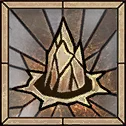 Earth Spike,
Earth Spike,  Claw,
Claw,  Storm Strike,
Storm Strike, 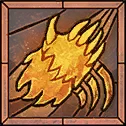 Maul, and
Maul, and 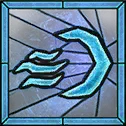 Wind Shear.
Wind Shear.
Spirit Skills
Spirit Skills are the main sources of damage of the Druid. Although they have no cooldown, the main limiting factor of Spirit Skills is their Spirit cost.
The Spirit Skills for the Druid are 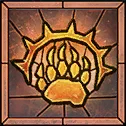 Pulverize,
Pulverize,  Landslide,
Landslide, 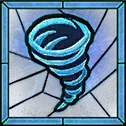 Tornado,
Tornado, 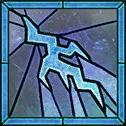 Lightning Storm, and
Lightning Storm, and 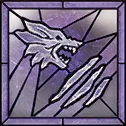 Shred.
Shred.
Defensive Skills
Defensive Skills revolve around protecting the Druid by reducing or healing damage taken or otherwise debilitating enemies. Although Defensive Skills generally have a fairly long cooldown.
The Defensive Skills for the Druid are  Cyclone Armor,
Cyclone Armor, 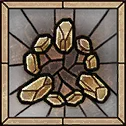 Earthen Bulwark,
Earthen Bulwark, 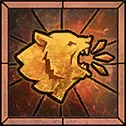 Debilitating Roar, and
Debilitating Roar, and 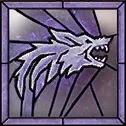 Blood Howl.
Blood Howl.
Companion Skills
Companion Skills passively summon permanent creatures that automatically attack the enemies of the Druid. These skills also have an active component, which “orders” the summoned creatures to perform a special offensive action.
The Companion Skills for the Druid are 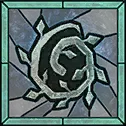 Poison Creeper,
Poison Creeper, 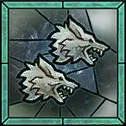 Wolves, and
Wolves, and 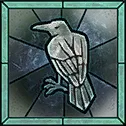 Ravens.
Ravens.
Wrath Skills
Wrath Skills are supplementary skills that provide various useful effects, usually crowd control. Although they do not cost Spirit to cast, they generally have a fairly long cooldown.
The Wrath Skills for the Druid are  Hurricane,
Hurricane, 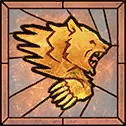 Trample,
Trample, 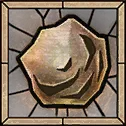 Boulder, and
Boulder, and  Rabies.
Rabies.
Ultimate Skills
Ultimate Skills are extremely powerful skills with a cooldown to match. Their use is typically reserved for dispatching powerful enemies or clawing your way out of desperate situations. Sometimes literally.
The Ultimate Skills for the Druid are  Cataclysm,
Cataclysm, 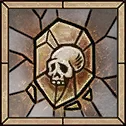 Petrify,
Petrify, 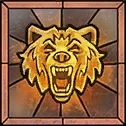 Grizzly Rage, and
Grizzly Rage, and 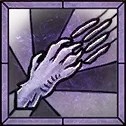 Lacerate.
Lacerate.
Druid Dismount Skill
While mounted, the Druid has access to a unique Dismount Skill which causes the Druid to jump off their mount, shapeshift into a Werebear while in mid-air, and slam into the ground, dealing damage to nearby enemies.
Druid Attributes
The four core attributes benefit each of the five classes in slightly different ways. Here are their effects for the Druid.
| Attribute | Effect 1 | Effect 2 | Effect 3 |
|---|---|---|---|
| Strength | 1 Armor per point | ||
| Intelligence | 2.5% All Resistances per 100 points | 10% Resource Generation per 100 points | |
| Willpower* | 10% Skill Damage per 100 points | 10% Healing Received per 100 points | 25% Overpower Damage per 100 points |
| Dexterity | 5% Critical Strike Chance per 100 points | 2.5% Dodge Chance per 100 points |
Endgame Druid Builds
The leveling builds listed at the top of this page are designed to take your Druid to Level 50. Afterwards, you should use an endgame build guide to allocate Paragon points and equip gear with the best stats and Aspects. The following endgame builds will help you optimize your character from Level 50-100.
Endgame Activities
Finish the storyline to unlock the various endgame activities in Diablo 4. Follow the yellow-marked quests, and you should have no trouble finding your way.
After finishing the main storyline, the game becomes quite open-ended. The following sections provide a quick list of the activities you should do, in approximate order.
Complete the Level 50 Capstone Dungeon
Switch the difficulty to World Tier 2 and complete the Level 50 Capstone Dungeon located in Kyovashad, Fractured Peaks. Once unlocked from completing the main storyline, the dungeon can be attempted even while below character Level 50. Clearing the dungeon can be difficult before you are level 45, as the enemies are fixed at Level 50. You must switch difficulty to World Tier 2 in order to see the dungeon and be able to enter it.
Once you have completed the Capstone dungeon, you can switch the difficulty to World Tier 3 to enable Sacred items and Nightmare Dungeons.
Tree of Whispers
The Tree of Whispers, located in Hawezar, rewards you for completing bounties found all over the game world. These are generally profitable activities that reward you with experience and items. They can be completed while doing other events and activities in a zone.
The Tree of Whispers is also your first source of Nightmare Sigils, used to activate Nightmare Dungeons. They are not guaranteed to drop, so keep turning in Whispers of the Dead until it appears.
Nightmare Dungeons
Nightmare Dungeons are arguably the main endgame activity in Diablo 4. Once you receive your first Nightmare Sigil from the Tree of Whispers, you can start clearing these dungeons. Nightmare Sigils continue to drop in Nightmare Dungeons, so you should never run out. Nightmare dungeons can only be performed in World Tier 3 or higher.
Nightmare dungeons are an essential part of the endgame (since their difficulty has a lot of potential for increase), providing you with a challenge in return for which you can receive great item rewards. Nightmare dungeons are also the only way to level up the Glyphs that are inserted into your Paragon board, which is crucial for increasing character power.
Helltides
Helltides appear on the map for players who are in World Tier 1 or higher, taking over large swathes of land for one hour. During this time, monsters killed in the affected area drop a special temporary currency that can be used to unlock chests found in the Helltide area.
Participating in Helltides is highly recommended. They are the only activity where you can reliably obtain ![]() Forgotten Soul, a crafting material required to Enchant Sacred and Ancestral items at the Occultist. Enchanting items to replace an undesirable property is key to optimizing your gear.
Forgotten Soul, a crafting material required to Enchant Sacred and Ancestral items at the Occultist. Enchanting items to replace an undesirable property is key to optimizing your gear.
Complete Renown in All Zones
Complete the remaining Renown stages in all of the zones. Since stages 4 and 5 are locked behind World Tier 3, doing the Capstone dungeon first is necessary.
Although Renown bonuses provide some Skill and Paragon Points, character power grows faster from leveling and finding gear upgrades. Completing Renown can be quite time consuming, so you should delay it until you are well geared with Sacred Items in World Tier 3 or Ancestral Items in World Tier 4.
Complete the Level 70 Capstone Dungeon
Completing level 70 Capstone dungeon (marked on your map with an orange dungeon entrance) unlocks World Tier 4, and with it the highest possible item type, Ancestral items.
The enemies in this Dungeon are fixed at Level 70, and the final boss is very punishing. We do not recommend attempting it before level 65.
Legion Events and World Bosses
Legion events and World Bosses are marked on the map. They are worthwhile activities to engage in, since they reward potentially good items.
Legion events are also good experience. Simply go to the marked area on the map and join other players in killing the enemies.
The Pit
The Pit is another type of endgame content, similar to Diablo 3’s Greater Rifts, which can be entered through a portal that is opened by a pillar located in Cerrigar. It is also the primary source for Masterworking materials as well as ![]() Stygian Stone (required to summon Level 200 Tormented versions of each Boss Ladder boss), making it one of the most important endgame activities to run.
Stygian Stone (required to summon Level 200 Tormented versions of each Boss Ladder boss), making it one of the most important endgame activities to run.
After reaching World Tier 4, you will receive a priority quest to complete a Tier 46 Nightmare Dungeon. Upon completion, you will unlock the possibility for Runeshards to drop from endgame content such as Whisper Caches, Helltides, and Nightmare Dungeons. Opening a pit portal requires one Runeshard.
The Pit has hundreds of tiers of difficulty, and the current highest tier you can unlock is Level 200.
The Gauntlet
The Gauntlet is a special dungeon on the Seasonal Realm that can only be accessed after reaching World Tier 4 and will challenge your skill, strategy, and speed in a race against time. Participating in the Gauntlet will put your skills to the test against other players, as you will be ranked on the leaderboard based on your score at the end of every run.






